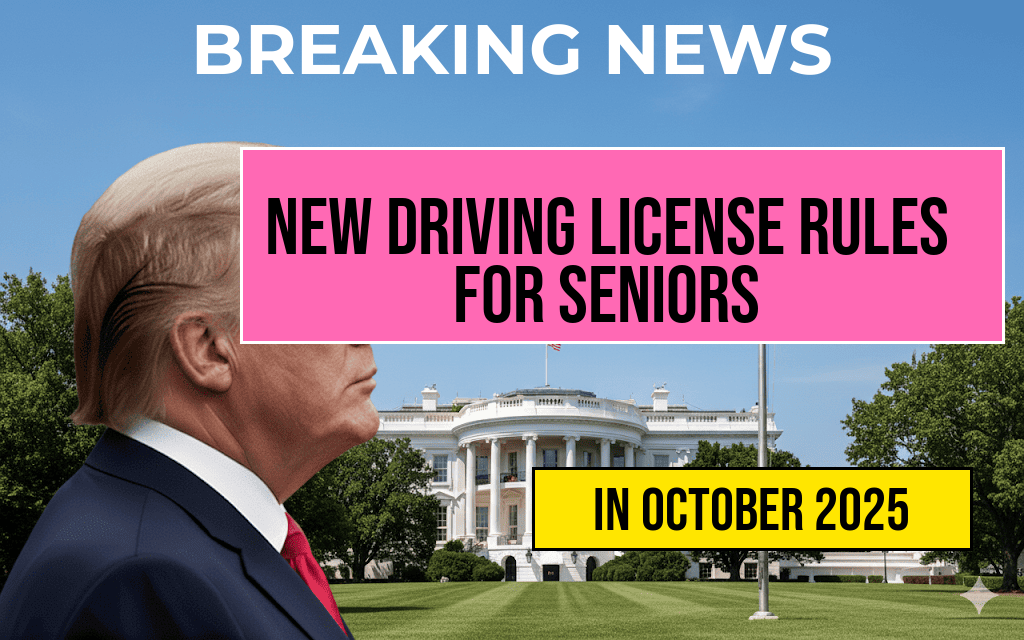As of October 2025, new driving license regulations will come into effect for seniors aged 70 and older, marking a significant shift in how states manage the licensing of older drivers. These changes aim to enhance road safety while addressing the unique challenges faced by an aging population. Under the new rules, seniors will be required to undergo more frequent vision tests and may need to complete a driving assessment to demonstrate their competency behind the wheel. This initiative has been met with a mix of support and concern, as it seeks to balance safety with the independence that driving provides to many elderly individuals.
Key Changes in Licensing Requirements
The upcoming regulations introduce several important changes that seniors should be aware of:
- Increased Testing Frequency: Drivers aged 70 and older will now be required to renew their licenses every two years instead of the previous five-year term.
- Vision Assessments: All seniors will need to pass a vision test at each renewal. This aims to ensure that drivers maintain the necessary visual acuity to operate a vehicle safely.
- Driving Evaluations: In some cases, older drivers may be required to complete a driving skills assessment, especially if there are concerns about their driving abilities.
- Educational Resources: States will offer refresher courses aimed at helping seniors adapt to new traffic laws and safe driving practices.
Why the Change is Necessary
The decision to implement these new regulations stems from growing concerns about the safety of older drivers on the roads. Statistics show that drivers aged 70 and older are more prone to accidents, often due to factors such as declining vision, slower reaction times, and medical conditions that can impair driving ability. According to the National Highway Traffic Safety Administration, older adults accounted for over 18% of all traffic fatalities in 2022.
State Responses and Variability
While the new regulations will be implemented at the federal level, states have the discretion to tailor their policies to meet local needs. For example, some states may choose to introduce more stringent testing requirements, while others might focus on educational initiatives. This variability could lead to a patchwork of regulations across the country, prompting concerns about consistency and fairness.
Support and Opposition
The changes have garnered mixed reactions. Advocates for senior safety argue that these measures are essential to protect both older drivers and the wider community. Organizations such as the AARP support increased testing as a means to ensure that older individuals can drive safely. They emphasize that these regulations are not intended to restrict mobility but rather to enhance safety on the roads.
Conversely, some critics argue that the new regulations could unfairly penalize seniors who are still competent drivers. Many older adults feel that the new requirements may lead to unnecessary stress and anxiety, potentially stripping away their independence. Advocacy groups are urging policymakers to consider alternatives, such as offering voluntary assessments instead of mandatory tests.
Implementation Timeline and Next Steps
As the October 2025 deadline approaches, states are beginning to prepare for the changes by updating their licensing systems and training staff to handle the new evaluations. Seniors are encouraged to stay informed about their state’s specific requirements and to participate in educational programs that promote safe driving practices.
| Change | Current Requirement | New Requirement (Effective October 2025) |
|---|---|---|
| License Renewal Period | 5 years | 2 years |
| Vision Test | Every renewal | Every renewal |
| Driving Assessment | Not required | Required in certain cases |
As these regulations come into play, it will be crucial for seniors and their families to engage in discussions about driving safety and mobility options. The balance between ensuring safety on the roads and preserving the independence of older drivers remains a pivotal issue as our population ages.
Frequently Asked Questions
What are the new driving license regulations for seniors starting in October 2025?
The new driving license regulations for seniors over 70 include more frequent renewal requirements and mandatory medical assessments to ensure that older drivers are fit to drive safely.
How often will seniors need to renew their driving licenses under the new rules?
Under the new rules, seniors aged 70 and over will need to renew their driving licenses every three years, compared to the previous five-year renewal period.
What type of medical assessments will be required for drivers over 70?
Drivers over 70 will be required to undergo medical assessments that evaluate their vision, cognitive abilities, and overall health to determine their fitness to drive.
Are there any exemptions for seniors regarding these new regulations?
Currently, there are no specific exemptions outlined for seniors regarding the new driving license regulations; all drivers over 70 will be subject to the same requirements.
How can seniors prepare for these upcoming changes in regulations?
Seniors can prepare for the upcoming changes by scheduling regular health check-ups, ensuring their vision is up to standard, and staying informed about the new regulations as the implementation date approaches.

Leave a Reply